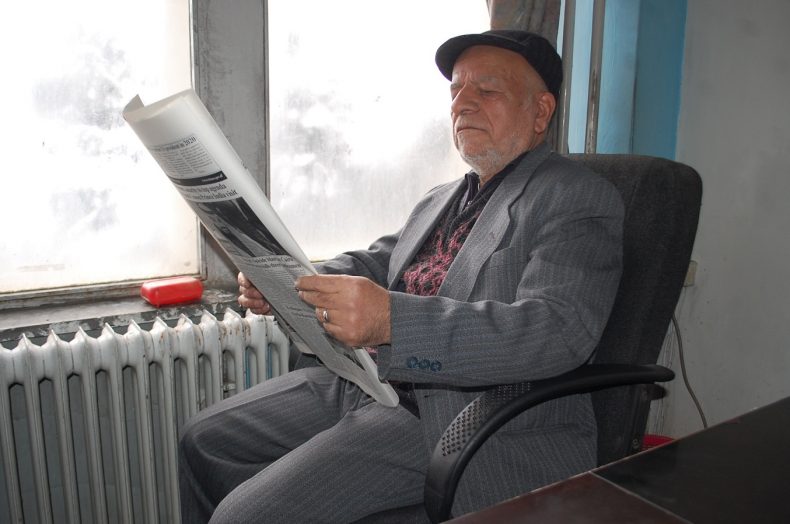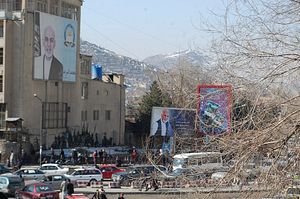KABUL — Mir Ahmad Shah Timory graduated from Literature Department of Kabul University in 1973, the same year Mohammad Daud Khan seized power in a coup and declared a republic. In 1975, Timory joined The Kabul Times, a government English-language newspaper, to report on government institutes. As it turned out, the government Timory was hired to report on lasted only five years.
The 70-year old editor has survived serving different five states, first as reporter then as an editor — four of the states he worked for collapsed, with the current Afghan state the lone exception. Timory edited stories on how the communists toppled General Daud Khan’s government in 1978, the Mujahedeen overthrew the communist regime in 1992, the Taliban group defeated many political parties to take control of the country in 1996, and finally the U.S.-led collation forces toppled the Taliban group to build Afghan state.
Timory now edits stories on two ongoing peace processes, but the state has been sidelined in both. In one, Zalmay Khalilzad, the U.S. State Department’s special envoy for Afghan reconciliation, has led several rounds of talks with the Taliban group. In the other, influential Afghan politicians set out to talk with the Taliban group in Moscow; another meeting will be held again in near future.
The elected and internationally recognized administration of Afghanistan has lasted through 17 years of bloody war with the Taliban group, but uncertainty increased over the survival of newly-established state amid the peace talks. The prospect of U.S. troop withdrawal, the possible Taliban agenda behind peace talks, and a lack of political consensus in Kabul will likely push the Afghan state, which was built by paying a high human cost, toward collapse.
U.S. Troop Withdrawal
For the second round of negotiations in Doha, Qatar, Khalilzad held talks with a Taliban delegation led by Mullah Baradar, co-founder and deputy leader of the group, who was recently released from Pakistani detention. The issues under consideration were a Taliban agreement to keep Afghan territory free of terrorists wanting to attack the United States and its allies, and the United States’ withdrawal of its troops out of Afghanistan.
“We have the same process,” says Fardaws Kawish, deputy of editor-in-chief of Hashte Subh Daily, a leading independent newspaper. “The Soviets wanted to withdraw their troops and reach an agreement to end the war, and now the United States also wants to withdraw its troops and reach an agreement to end the war.”
In 1989, the Soviets began troop withdrawal without agreeing on an accord to determine the fate of the Afghan state. Three years later, the communist-led state collapsed and former resistance forces against the occupation of the Soviets took control of the country. The Taliban, which defeated the resistance forces in 1996, now demand a full U.S. withdrawal before talking with current Afghan state.
“There should be an accord before the U.S. withdraws troops,” says Kawish, who also an writes opinion section for Hashte Subh. “The U.S. withdrawal should be part of an accord agreed between the U.S., the Taliban, and the government.”
Kawish explains that it was the collapse of the state in 1990s Afghanistan that led to the 9/11 attack and the uprising of jihadists near the borders.
The Taliban’s current promises – to keep terrorists out of Afghan territory — seem not enough to prevent another scenario of state collapse in Afghanistan. The United States’ hopes for a full-fledged democracy in Afghanistan have faded away and Washington now seeks withdrawal, a move that has increased fear over yet another collapse of the Afghan state.
Taliban Motives
The Taliban has succeeded in their persistence to talk with the United States, but there is uncertainty that the group will deliver its promises. Washington wants an assurance that Afghanistan would not be turned into safe haven for terrorist groups, including the Islamic State, which has already gained strongholds in the country.
“Within the Taliban group, there are many different groups” that oppose each other, says Atiqullah Amirkhil, a retired army general. “The Taliban group cannot prevent groups like al-Qaeda from operating or the emergence of a new similar [terrorist] group … [that] wants to build an emirate.”
But the group may be dangling that promise to seek its own ultimate goal. “All efforts of the Taliban are focused on a full U.S. and NATO troop withdrawal, which will enable them to break the stalemate and to overrun Kabul militarily,” says Aziz Koshan, a Kabul-based researcher.
Koshan emphasizes that the nature of the Taliban movement is not compatible with the democratic political system of Afghanistan. “They want to take over power with an election? No, because nobody will vote for them,” says Koshan, referring to the latest report by the Asia Foundation that found 82 percent of Afghans prefer the Afghan state over the Taliban. “It would political suicide for the Taliban to join the state.”
The Taliban group enjoys control of nearly half of the county and illegal mining and drug-trafficking fuels their fight. Fighters of the Taliban group have been in the mountains through the last 17 years and received more in cash from mining and drug-trafficking much more than the government pays its employees.
As peace talks heated up last winter, the Afghan government, along with its allies, decreased attacks on Taliban positions, which served as an opportunity for the Taliban to prepare for a strong spring offensive. Afghan national security forces have the upper hand in winter, while the Taliban fighters have the advantage in spring and summer.
There is anxiety that the Taliban group will seize the momentum to conduct a strong offensive in the spring and topple the government. Earlier, a Taliban negotiator publicly announced that the United States had agreed to begin troop withdrawal in April, which would be the time for the start of Taliban spring offensive.
“Those who want to topple the government will use every means,” says Amirkhil, the retired general. “… At this moment, the Taliban group carried out attacks… If they want peace, what was the use of the attacks?”
On March 11, The Taliban group wiped out an Afghan Army Company in Badghis Province. Taliban fighters killed 16 soldiers and captured as many as 40 others. Earlier, on March 1, Taliban fighters stormed Shorab Military base in Helmand province, where U.S. troops were also stationed. The gunbattle lasted more than 24 hours and killed at least 25 Afghan soldiers.
Lack of Political Consensus in Kabul
However, while the Taliban negotiate with the United States in Doha to shape Afghanistan’s fate, Afghan political leaders are falling apart in Kabul.
Former President Hamid Karzai, along with as many as around 40 politicians, attended a meeting with the Taliban group in Moscow on February 5, 2019. In doing so, Karzai bypassed the state he had built in 2001, as the government had condemned the meeting.
“It was a mere miscalculation by some of the Afghan politicians to attend the Moscow Peace talks with the Taliban,” says Koshan, the Kabul-based researcher. “The politicians undermined the state and favored the Taliban.”
Many of the 40 politicians that attended the Moscow meeting are running in the July presidential vote, including Haneef Atmar. These politicians accuse President Ashraf Ghani of jeopardizing peace process, while Ghani’s running mate, Amrullah Saleh, called them “useful idiots.”
Khalilzad, before going to Doha talks with the Taliban, called on Afghan politicians in Kabul to form a political consensus over peace talks. But so far, the politicians have fallen apart instead of finding unity.
Koshan argues that as a democratic state where the legitimacy of the government being drawn from the people, the government is obliged to consult with the Afghan people on national issues. That’s the logic behind the call for the Consultative Loya Jirga — Traditional Grand Council — next month.
The council would include about 2,000 Afghan representatives from across the country to provide advice on how to move forward. Mohammad Umar Daudzai, Ghani’s special envoy for peace, said he hoped that the meeting would create consensus.
Yet rival politicians are calling the gathering into question. “I will not attend Loya Jirga if it would be for personal purposes,” said Atta Mohammad Noor, who the attended Moscow meetings with the Taliban, during in an interview with a local television network. “President Ghani wants to extend his presidency for one more year.”
At this key movement, the cooperation among politicians would likely contribute to the survival of the democratic system. But these Afghan elites have survived in the last four decades of war by reaching short-term deals with each other and seem determined to continue to go it alone.
Gulbuddin Hekmatyar, leader of Hezb-i-Islami, which signed a peace deal with the government in 2016, said during an interview with a local television that formation of an interim government would be an option to achieve peace in the country. Hekmatyar, who fought against the government for 16 years, added that he had as many as “10,000 armed men in the country” who could begin fighting if they were “forced” to do so.
Following the collapse of the Afghan state in 1992, Hekmatyar, along with other Afghan powerbrokers, failed to execute an arrangement to share power. The factions began a civil war that ruined the capital, Kabul, and later on paved the way for the emergence of the Taliban.
The country’s fractious elites still put forward their personal interests instead of national interests. At this movement, they have failed to stick with the state, built through a high price in blood from ordinary Afghans.

Mir Ahmad Shah Timory reads a newspaper in his office. Photo by Ezzatullah Mehrdad.
For the last 40 years of ups and downs in the history of Afghanistan, Timory, still an editor at the crumbling building of The Kabul Times, has remained committed to the state – even as the state itself constantly changed.
In 2013, Timory retired at the age of 65, but the government asked him to continue working as member of the editorial board. Three months ago, the government stopped paying him, only providing his retirement income of $1,440 per year.
Yet each day, Timory walks about an hour from his home to his office, passing government institutions surrounded by bulletproof walls and armored vehicles. Neither the government institutes nor the armored vehicles hold the decision makers who will determine the fate of the Afghan state he works for. In luxury hotels and rich capitals, the United States and the Taliban may reach a deal that leads to the collapse of yet another Afghan state Timory had served.
Ezzatullah Mehrdad is a freelance journalist based in Kabul. His work has appeared in The Diplomat Magazine, South China Morning Post, Times of Israel, and many more.
































